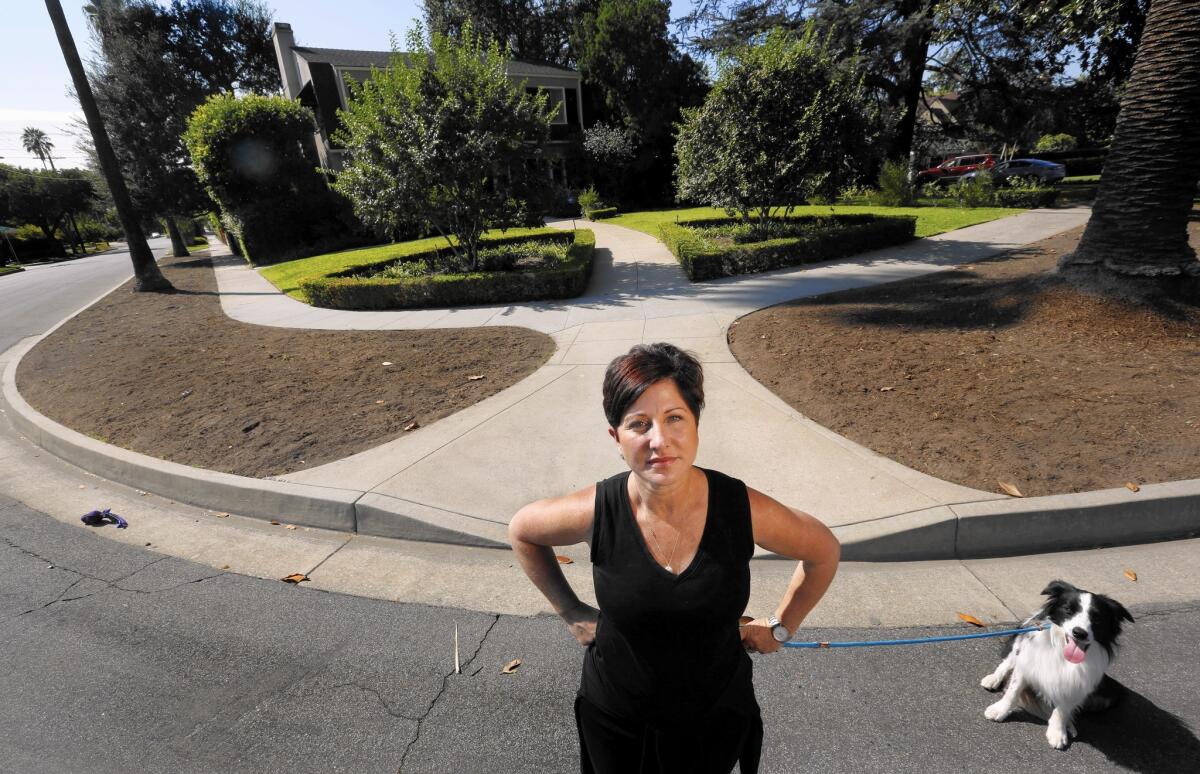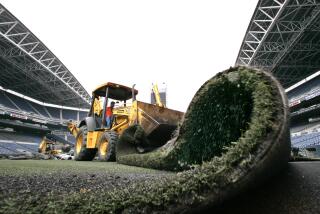Column: IRS may come knocking for some taxpayers who receive turf rebates

- Share via
Tina House spent months on the math of water conservation, trying to figure out what to do about the thirsty parkways that wrap around her family’s Pasadena home.
On her stately stretch of East Mountain Street, those strips of grass between the sidewalk and the street are as big as yards in some other neighborhoods.
Turning off the sprinklers on the 2,100-square-foot parkway would cut about $40 a month from the family’s water bill. But replacing the grass with something more drought friendly would cost several thousand dollars — an expense that could take a decade to recoup.
When the Metropolitan Water District offered her a $4,210 rebate for the swap, the project seemed to make financial sense. So she called the gardener who’d landscaped the yard 15 years ago; he dug up the grass last week and hauled it off.
But the calculation of conservation changed when House realized that Uncle Sam could pocket much of her rebate.
Under current federal guidelines, those rebates can be treated like income instead of reimbursement.
California provides a state tax exemption for turf removal rebates, but the feds have not yet reckoned with our plight — meaning some folks may wind up putting some of what they save on their water bills toward tax checks to the IRS.
“I did so much research,” House said, “into how much water it would save, what it would look like, how much it would cost. I thought I had everything covered. But I hadn’t Googled ‘taxes.’”
::
House is not alone.
More than 65,000 homeowners have been approved for reimbursements. Last year the MWD raised the rebate amount for turf removal from 30 cents to $1 — and then to $2 — per square foot.
Most are only now finding out that they may be liable for taxes.
The issue is surfacing because of the size of the rebates, said MWD’s Deven Upadhyay. “In previous years, we rarely saw a [residential] rebate over $600.”
That’s the IRS threshold for reporting rebates as income. Until last year, that primarily applied to commercial properties with large areas of turf to replace.
“But since we ramped up in response to the drought, there’s been a surge in residents who have significant amounts over $600,” Upadhyay said.
Some qualified for more than $70,000. Imagine their surprise at income tax time.
MWD officials are hoping the state’s Franchise Tax Board can negotiate with the feds for California taxpayers. But in the meantime, the water agency has begun tracking down people who’ve already used their rebates and provide the tax info they’ll need.
Upadhyay doesn’t think this will make the grass removal campaign less attractive. “There are multiple reasons to consider it, not just the money we’re offering,” he said.
Not that it matters. They’re not offering money any more.
::
So many people applied for the rebates that the agency’s pool ran dry in July.
“The money that we budgeted is spoken for,” Upadhyay said. “We have a waiting list. But that will only be funded if someone drops out. If people choose not to finish, that will free that money up for somebody on the waiting list.”
If House hadn’t already paid her gardener $800 to get her parkway ready for its makeover, she’d hand over her spot.
“I would not have done this if I thought there was a chance we would have to pay $1,400 or $1,500 in taxes,” she said. “Some people may say ‘whatever.’ But that’s a big chunk of change to us.”
Years ago, she and her husband converted their backyard into a space that needs little more than hosing down now and then. Their front lawn is lush, but the yard has low-maintenance foliage and drought-tolerant crape myrtle trees.
“We would have found other less expensive ways to manage saving water,” she said. “I wish I’d listened to my mother.”
Her mother minimizes toilet flushing. And she cooks a lot of spaghetti — she fills her pasta pot with water that flows from the faucet while she’s waiting for it to warm up.
“She said just turn off the sprinklers and you’ll be fine,” House said.
But that might hurt the parkway’s ancient Canary Island Palm, with its trunk already warped from previous droughts. And House didn’t want patches of dead grass to make her space an eyesore; she’s on the corner lot of a beautiful block of perfectly tended homes.
So she and her gardener are walking the neighborhood, trying to find inexpensive options she can embrace.
She wanted decomposed granite, but it costs too much. Even gravel is outside her budget. She’s trying to learn to love mulch.
“Getting this to fit into $4,000 is taking a lot of effort,” she said. “A lot of back and forth.”
In fact, she’s spending so much time asking questions and agonizing over choices, the price tag may go up.
Her gardener has threatened to send her a bill for the “therapy” the project requires. And he’s not offering a rebate for that.
Twitter: @SandyBanksLAT
More to Read
Sign up for Essential California
The most important California stories and recommendations in your inbox every morning.
You may occasionally receive promotional content from the Los Angeles Times.











